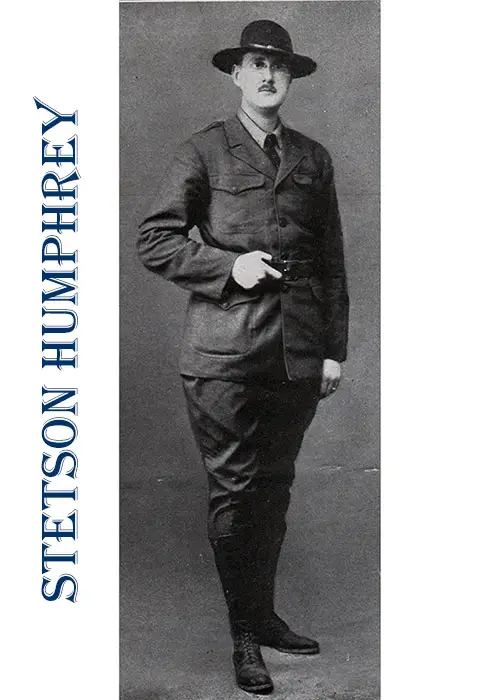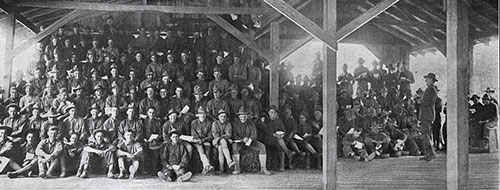Camp Dix Song Leader - Stetson Humphrey - 1918

STETSON HUMPHREY Camp Song Leader
Army experts agree that a singing army is the best fighting army. The men of the Crusades were singers, Cromwell’s men were inspired by their songs as they downed the old tyrants of England, the Provencal volunteers marched into Paris to the tune of the Marseillaise and stormed the Tuileries, our own Battle Hymn of the Republic helped us to win the Civil War.
A singing army is a winning army. Recognizing this officially, Uncle Sam, acting through the War Department Commission on Training Camp Activities, has assigned a Song Leader to each of the big Training Camps, the one at Camp Dix being Stetson Humphrey.

Stetson Humphrey Leading his A.E.F. Choir
Mr. Humphrey has a big job, but then he is a big man, both physically and experientially, and is getting big results. Starting with quartets in each of the outfits, his work has been progressively organized until now, song leaders have been appointed for each company and fifteen minutes set aside daily for mass singing. To hear men out on a hike singing as they go swinging along is now the usual thing.
STETSON HUMPHREY - Camp Song Leader Until August, 1918
Huddled around the barracks stoves during the bitter cold weather of last Winter, or with shirt sleeves rolled up last Summer and perched on hay bales under the shade of a shed roof, many were the rousing sings at Dix.
Uncle Sam last year started training the boys on the basis that a-singing army is the best fighting army. The boys all took to the idea—and the Kaiser abdicated and fled.
Whether just a barracks quartet, or that never- to-be-forgotten sing by 40,000 on the Dix parade ground last Fourth of July morning, or the joyous explosion and outburst of song when victory was announced, all the world now knows that the American soldier is a singing soldier and—he has never been defeated.
A tribute to singing as a military necessity among soldiers on the march is made by Major General Scott in an official bulletin issued by him at camp headquarters. Ever since the first day he assumed command of Camp Dix, General Scott has studied the psychological effects of singing on marching soldiers. He has found that a “song a mile for the last ten miles” of a long hike is essential.
“While marching nothing will so effectively keep up the spirits of the men and prevent them from straggling as the singing of marching songs,” says General Scott. “The soldier’s mind is thus stimulated and instead of thinking of the weight of his equipment or his physical weariness he develops a dogged and cheerful determination.
As a cadence exercise, singing is of great value in teaching combined and concerted action. Men fail to keep in step on the march not by the fault of the legs, but by the fault of the mind. They do not fool the cadence, swing or rhythm of the march mentally. The mind, more than the leg, is in need of training. Keeping in perfect step is a mental, not a physical, matter.”
To Camp Song Leader Stetson Humphrey, who was sent to Dix by the War Department Commission on Training Camp Activities, belongs a large share of the credit for turning out singing soldiers at Dix.

